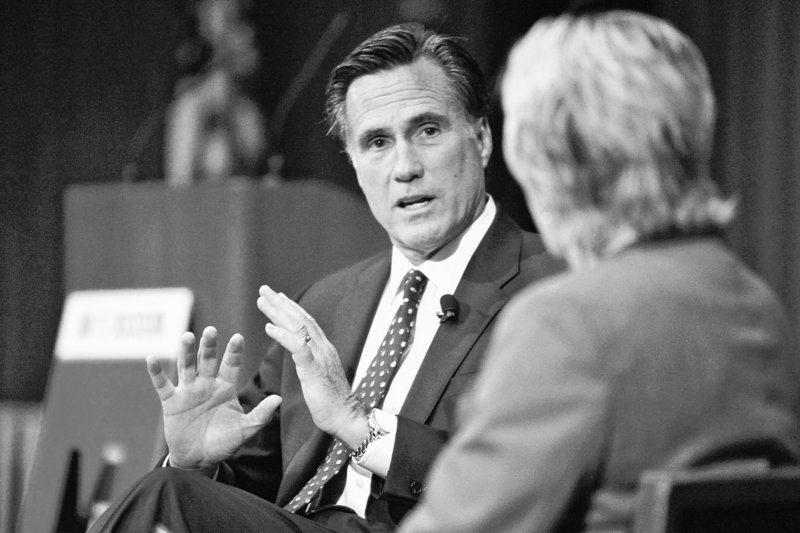WASHINGTON — The tea party’s demands for ideological purity have caught some GOP presidential hopefuls off guard, forcing them to awkwardly defend past decisions as they watch hard-right rivals gain ground.
It’s painfully ironic for some of the Republicans most often mentioned as possible challengers to President Barack Obama in 2012. Stances that gave them national attention and credibility are now being used as cudgels to attack them as wobbly centrists.
Minnesota’s Tim Pawlenty, for instance, gained a reputation as a pragmatic governor of a Democratic-leaning state. But now conservatives are berating him for accepting federal stimulus funds that helped him close a budget gap.
South Dakota Sen. John Thune, who also draws talk as a possible 2012 contender, said a federal bailout of banks was needed when he voted for the plan in 2008.
Now, with tea party activists railing against the bailout, Thune is pushing efforts to end it.
And Mitt Romney, the closest thing to an early front-runner — and, perhaps, the establishment candidate — is struggling to explain why he expanded health care as Massachusetts governor, even as he attacks Obama’s similar plan for the nation.
Meanwhile, there’s increasing buzz about some hardline conservative Republicans who, until recently, rarely drew mention in presidential conversations. Chief among them is Texas Gov. Rick Perry.
He handily defeated Sen. Kay Bailey Hutchison in last month’s Republican gubernatorial primary after positioning himself to her right on nearly every issue.
And libertarian-Republican Ron Paul bested Romney and everyone else in a straw poll of presidential favorites at February’s gathering of the Conservative Political Action Conference.
Perry and Paul are among the numerous potential candidates scheduled to speak this weekend to about 3,000 activists in New Orleans at the Southern Republican Leadership Conference.
For now, at least, the fastest-rising Republicans seem to be those most in sync with tea partiers’ aversion to taxes and Washington-based programs and regulations.
Former Alaska Gov. Sarah Palin, the GOP’s vice presidential nominee in 2008, draws big, enthusiastic crowds wherever she goes, even if party insiders question her ability to be elected president. She’ll be in New Orleans, too.
In Texas, Perry fended off Hutchison’s challenge by running as an anti-Washington, antiestablishment candidate. He welcomed support from tea party activists and other hard-core conservatives.
Romney and other more pro-establishment contenders are edging to the right and anxiously watching to see how high the tea party tide will rise.
Such tensions are likely to complicate the Republican presidential picture for the next two years, said Democratic consultant Chris Lehane, who worked on Al Gore’s 2000 presidential campaign.
Potential GOP candidates are caught between two vital bases, he said: Wall Street’s deep-pocketed pragmatic interests and the high-decibel, uncompromising views of the tea party.
GOP presidential hopefuls who can’t figure out how to navigate that road, Lehane said, “will get run over.”
Perry is not well known outside Texas, and his chances of being president in three years might seem slim. But the same could be said of almost any of the two dozen or so Republican potential challengers at this early stage.
Still, “a serious contender is certain to rise” eventually to oppose Obama, said Washington-based Republican consultant Terry Holt.
It’s neither surprising nor troubling, he said, that the GOP field is big and unsettled for now.
“My sense is that Romney has some distinct advantages,” Holt said, including name recognition and fund-raising powers.
But Congress’ bitter fight to enact Obama’s rewrite of U.S. health care laws, plus the dramatic rise of a staunchly conservative movement headed by self-described tea party activists, are causing Romney fits.
He called last month’s passage of the Democratic health care bill “an unconscionable abuse of power,” and urged its repeal.
But critics on the left and right note similarities between the Obama bill and Romney’s 2006 Massachusetts law, which imposed new taxes plus a fee on people who don’t buy health insurance.
Former Obama and Romney health adviser Jonathan Gruber didn’t help matters when he told the Boston Globe that Romney is “in many ways the intellectual father of national health reform.”
Copy the Story Link
Send questions/comments to the editors.



Success. Please wait for the page to reload. If the page does not reload within 5 seconds, please refresh the page.
Enter your email and password to access comments.
Hi, to comment on stories you must . This profile is in addition to your subscription and website login.
Already have a commenting profile? .
Invalid username/password.
Please check your email to confirm and complete your registration.
Only subscribers are eligible to post comments. Please subscribe or login first for digital access. Here’s why.
Use the form below to reset your password. When you've submitted your account email, we will send an email with a reset code.